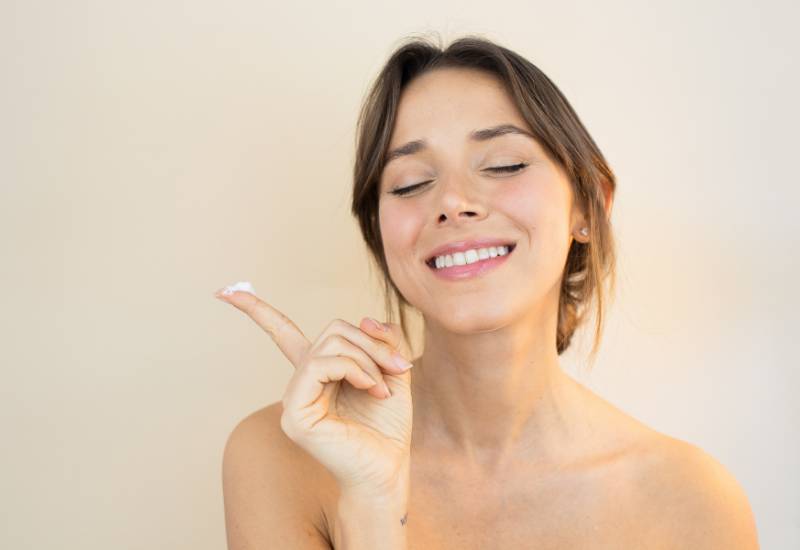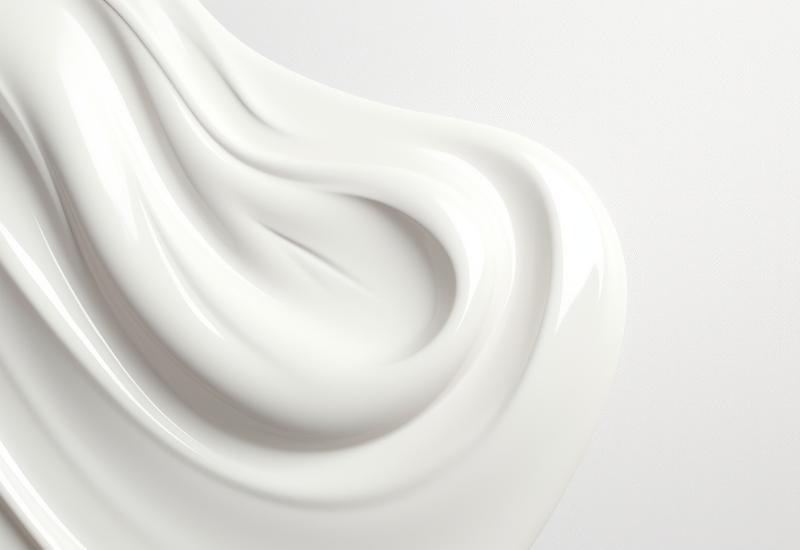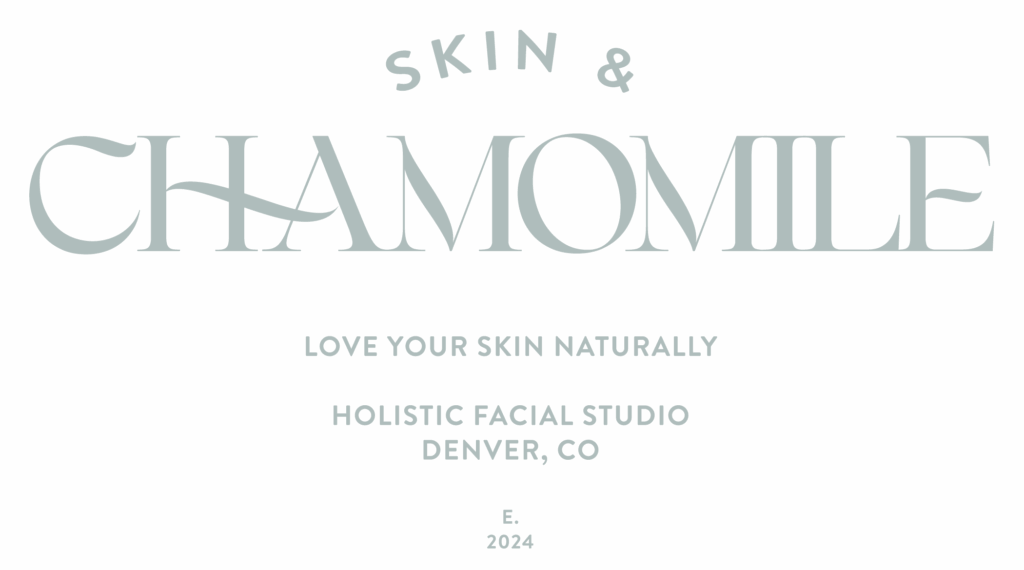Stress and Skin: How Getting Regular Facials and Using Natural High-Quality Products Helps Your Complexion (And Health!)
10/03/25

Remarkably, the connection between our emotional state and our skin runs deeper than many of us realize. Stress isn’t just something that lives in the mind—it is a whole-body experience that often reveals itself on the skin. From sudden breakouts to a dull, tired-looking complexion, stress can manifest in ways that remind us to slow down, breathe, and tend to our bodies with care.
The Physiological Landscape of Stress
Firstly, when we encounter a stressor—whether it’s a looming deadline, a difficult conversation, or travel—our body responds with a cascade of hormonal and inflammatory signals. It’s true – the primary player is cortisol, the “stress hormone.” Cortisol mobilizes energy and primes the body for a quick response, but its effects on the skin can be far from ideal if the stress response remains elevated over time.
Key skin-relevant effects of cortisol and related pathways include:
- Increased sebum production: For some, excess cortisol can boost oil production, contributing to clogged pores and acne flare-ups.
- Impaired barrier function: Stress can reduce the skin’s natural moisture barrier, leading to dryness, sensitivity, and greater transepidermal water loss.
- Inflammatory shifts: Chronic stress tends to bias the immune response toward a pro-inflammatory state, which can worsen redness, irritation, and inflammatory skin conditions.
- Impaired collagen synthesis: Long-term stress can blunt collagen production, contributing to slower wound healing and subtle signs of aging.
- Altered wound healing: Recovery from micro-injuries and daily wear can slow down when stress hormones are elevated.
Overall, your skin is trying to tell you something when you are under stress. And, it might reveal itself in any of of the ways above.
Stress Manifestations in Different Skin Types
The way stress shows up isn’t one-size-fits-all. Your baseline skin type, sensitivity, and health shape your skin’s response.
- Oily, acne-prone skin: Stress may trigger or worsen breakouts by increasing sebum production and inflammation. You might see deeper, cystic pimples around the jawline and chin, or sudden flare-ups in hormonal windows.
- Dry or sensitive skin: The barrier may become more fragile under stress, amplifying redness, tightness, and stinging sensations. Irritation from environmental factors can feel more pronounced.
- Combination skin: You might notice simultaneous dryness in some areas and oiliness in others, with stress tipping toward congestion or eczema-like flares in reactive patches.
- Mature or aging skin: Stress can accelerate dullness, fine lines, and slower recovery from micro-injuries or sun damage, partly due to barrier disruption and reduced collagen turnover.
No matter your skin type, the common thread is that stress shifts the skin’s ecosystem toward imbalance. A mindful Denver facial routine that supports the skin’s natural defenses can mitigate many of these effects.
The Mind–Skin Connection: Why Stress Impacts Skin So Clearly
Two major channels explain the mind–skin connection:
- Neuroendocrine signaling: Stress triggers the hypothalamic–pituitary–adrenal (HPA) axis, releasing cortisol and other mediators. These molecules influence sebaceous glands, immune cells, and skin cells, altering hydration status and inflammatory tone.
- Behavior and lifestyle: Stress often changes sleep, appetite, activity, and skincare habits. Poor sleep, caffeine or alcohol use, and skipping routine maintenance can worsen skin health, creating a feedback loop of stress and appearance.
Acknowledging both channels helps us design interventions that address biology and behavior—benefits you’ll feel after a Denver facial or in a Colorado skincare routine that emphasizes barrier health.

Practical, Natural Approaches to Support Skin During Stress
The aim isn’t to eliminate stress but to strengthen the skin’s resilience and reduce vulnerability to stress-related factors. Below are evidence-informed, gentle strategies you can weave into a balanced skincare and self-care routine, plus Denver-specific notes for facial care in CO.
1) Gentle, Barrier-Supportive Skincare
- Hydration + barrier repair: Prioritize humectants (glycerin, hyaluronic acid) and barrier-supporting lipids (ceramides, cholesterol, fatty acids). A well-hydrated barrier reduces sensitivity and minimizes transepidermal water loss during stress spikes.
- Soothing botanicals: Chamomile, allantoin, and oat-derived extracts calm irritation. Green tea extract provides antioxidant protection and anti-inflammatory benefits.
- Niacinamide (Vitamin B3): Supports barrier function, reduces transepidermal water loss, and has anti-inflammatory properties for redness and uneven texture.
- Non-irritating exfoliation: If you use light chemical exfoliation, keep it gentle (low-concentration AHAs in forgiving formulas or enzyme-based exfoliants) to avoid compounded sensitivity during stress.
- SPF daily: Stress can make skin more reactive; UV exposure compounds inflammation and aging. A mineral or hybrid sunscreen with broad-spectrum protection is a steady anchor—especially in Denver’s high-altitude sun.
Denver SEO notes: Include phrases like “facial in Denver CO,” “Denver skincare routine,” “Colorado facial treatments,” and “best facial Denver” naturally in copy to capture local search intent.
2) Sleep, Stress Management, and Routine Consistency
- Sleep-friendly routines: Consistent sleep supports cortisol regulation and skin repair. Create a wind-down ritual, limit screens before bed, and keep a regular sleep schedule as possible.
- Stress-reduction practices: Short daily practices—5–10 minutes of breathing, gentle stretching, or a brief mindfulness exercise—can lower cortisol levels and inflammatory markers.
- Ritualized skincare as self-care: Treat your routine as a nourishing ritual rather than a race. Mindful application improves adherence and reduces stress around your routine.
Practical tip: Keep your routine portable. A small travel bottle of your cleanser, a gentle moisturizer, and a mini SPF can help you maintain consistency when schedules shift. If you’re visiting Denver, look for skincare clinics offering quick stress-relief facials to fit a busy itinerary.
3) Nutrition and Hydration to Support Skin Resilience
- Omega-3 fatty acids: From fatty fish, flaxseed, or walnuts, these fats modulate inflammation and support skin barrier function.
- Antioxidant-rich foods: Berries, leafy greens, colorful vegetables, and green tea counter oxidative stress that worsens texture and tone.
- Hydration with intention: Consistent water intake supports hydration during dry seasons and stressful periods.
Denver tip: Local wellness scenes often bundle hydration with antioxidant-rich meals—consider seeking a Denver facial that pairs with nutrition guidance from a local esthetician.
4) Targeted Botanical Support
- Chamomile and green tea extracts: For daytime soothing and antioxidant protection.
- Licorice root extract: Gentle brightening and anti-inflammatory action to help redness and even tone when used appropriately.
- Aloe vera and oats: Calm, moist skin during flare-ups.
Important note: If you have sensitive or rosacea-prone skin, patch-test any new botanical product and introduce new actives slowly to monitor tolerance.
5) Mindful Sun Protection
Sun exposure remains a major contributor to pigment changes and inflammation. In Denver, solar intensity is higher due to altitude, so sunscreen is non-negotiable.
- Reapply every two hours outdoors.
- Use mineral-based formulas if sensitive to chemical filters.
- Seek shade during peak sun hours and wear protective clothing when possible.
Denver SEO: Use phrases like “SPF Denver CO,” “sun protection for high altitude,” and “best mineral sunscreen Denver.”
6) Professional Guidance as a Support, Not a Barrier
If stress consistently impacts your skin, a skincare professional can tailor a plan that accounts for lifestyle, climate, and skin type. A Denver facial expert can optimize barrier-supporting products, review medication interactions, and design a patch-test–ready regimen.
A Colorado Lens: How Our Environment Modulates Stress’s Skin Effects
Colorado’s climate—high altitude, strong UV exposure, and dry air—adds complexity to stressed skin. The combination of dryness, higher UV exposure, and dramatic weather shifts can amplify inflammation and barrier disruption.
- Dry climate: Prioritize hydration and barrier-supporting ingredients. Layer a lightweight hydrating serum under a richer moisturizer as seasonal needs shift.
- Altitude and sun exposure: Regular sunscreen is essential, even indoors near windows. UV reflection from snow increases cumulative exposure.
- Seasonal stressors: Changes in sunlight, allergens, and outdoor activity can alter skin needs. A flexible Denver facial routine that adapts to seasons supports stability.
SEO note: Emphasize Denver-specific terms such as “facial in Denver CO,” “Colorado facial clinic,” “Denver spa facial,” and “facial for sensitive skin Denver.”
Building a Gentle, Sustainable Plan for Denver Residents
If you’re starting from scratch or seeking to refine your current approach, here’s a compact, effective 4–6 week blueprint tailored for Denver life:
Baseline and barrier repair (Week 1–2)
- Cleanser: gentle, sulfate-free
- Serum: niacinamide 5% or gentler alternative
- Moisturizer: ceramides/peptides with hydrating base
- SPF: mineral broad-spectrum sunscreen
- Sleep and stress: 5-minute nightly wind-down
Add light exfoliation and antioxidants (Week 3–4)
- Introduce a low-concentration exfoliant or enzyme-based product a few times per week
- Next, add an antioxidant serum (e.g., vitamin C derivative) in the morning
- Maintain barrier-supporting routine and SPF
Personalize and optimize (Week 5–6)
- Monitor response to any new actives
- Adjust hydration levels with season changes
- Finally, integrate a weekly calming mask or hydrating treatment if needed
Key takeaway: When you visit a Denver skincare clinic for a facial, you can expect custom recommendations that align with high-altitude sun exposure, dry air, and seasonal shifts.
Managing Expectations: A Realistic View
- Improvement timeline: Noticeable texture and brightness changes can appear after 4–8 weeks of consistent care; more robust changes in 3–4 months.
- Patience and gentleness: Quick fixes are tempting, but long-term resilience comes from gentle, consistent care aligned with your skin’s biology.
- Individual variation: Skin responds uniquely. Treat changes as experiments and track what works best for you, especially across Denver’s seasons.
The Beauty of a Mindful, Natural Approach
Choosing a stress-aware skincare path isn’t about chasing perfection; it’s about honoring your body’s rhythms and supporting your skin’s healing powers. A barrier-centered routine, combined with practical stress management and sun protection, can help you cultivate a complexion that reflects inner balance—radiant, resilient, and uniquely you. In Denver, a facial that respects high-altitude skin health can be a cornerstone of this approach.
About Skin + Chamomile
At Skin + Chamomile, we understand that true skin health begins from within. Our holistic approach blends gentle skincare with evidence-based practices to support your skin’s natural healing processes. We tailor routines to your life, climate, and concerns, helping you cultivate a calm, luminous complexion.
Ready to nurture your skin from the inside out in Denver, CO? Schedule a relaxing facial treatment to de-stress and connect with an esthetician. Together, we can design a personalized plan that fits your busy life and our Colorado environment.
Book your stress-and-skin session at our Denver facial studio and discover how mindful care can transform your complexion (and mood!).

References:
Dhabhar, F. S., McEwen, B. S., & Spencer, R. L. (1996). Effects of stress on skin: Implications for dermatology. Psychoneuroendocrinology, 21(2), 75-89. Link: https://doi.org/10.1016/S0306-4532(96)00058-6
Godha, P., Jha, N., & Im, S. (2012). Cortisol modulation of sebaceous gland function and inflammatory gene expression in human sebocytes. Journal of Investigative Dermatology, 132(4), 812-821. Link: https://doi.org/10.1038/jid.2011.345
Glaser, R., & Kiecolt-Glaser, T. (2006). Stress and the immune system: A review of psychoneuroimmunology. Biological Psychiatry, 60(3), 178-179. Link: https://doi.org/10.1016/j.biopsych.2006.03.005
Dhabhar, F. S. (2014). Effects of stress on immune function: The good, the bad, and the beautiful. Immunologic Research, 58(2-3), 193-210. Link: https://doi.org//10.1007/s12026-014-8534-6
Marucha, P. T., Erickson, D., & Diver, K. (1998). Rapid suppression of healing by stress. Archives of Surgery, 133(4), 420-424. Link: https://doi.org/10.1001/archsurg.133.4.420
Kiecolt-Glaser, J. K., McGuire, L., Robles, T., & Glaser, R. (2002). Emotions, morbidity, and inflammatory pathways: A prospective study of dental students. Brain, Behavior, and Immunity, 16(3), 291-302. Link: https://doi.org/10.1016/S0889-1591(02)00057-8
Tosti, A., Pazzini, C., & Zingoni, E. (2010). The role of stress in acne pathogenesis. Journal of the European Academy of Dermatology and Venereology, 24(12), 1437-1444. Link: https://doi.org/10.1111/j.1468-3083.2010.03924.x
Slominski, A. T., Zmijewski, M. A., & Zbytek, E. (2012). Cortisol and the skin: Implications for health and disease. Pharmacology & Therapeutics, 133(1), 105-115. Link: https://doi.org/10.1016/j.pharmthera.2012.07.003
Olsen, C. M., et al. (2013). Ultraviolet radiation, vitamin D, and melanoma: A review. Critical Reviews in Oncology/Hematology, 86(2), 105-119. Link: https://doi.org/10.1016/j.critrevonc.2013.02.002
Cichon, L. A. (2020). High-altitude environmental effects on skin barrier function. Journal of Cosmetic Dermatology, 19(6), 1202-1209. Link: https://doi.org/10.1111/jocd.13564
Skin + Chamomile | Denver Facial and Skincare Studio
Located inside Nurture at 2949 Federal Blvd. Suite #210, Denver, CO 80211
Phone: 817-454-4059
Online Booking + Appointments: Click Here to Book

Hours:
Mon 8am – 7pm
Tues. 8am – 7pm
Weds. 8am – 7pm
Thurs. 8am – 7pm
Fri. 8am – 7pm
Sat. 8am – 7pm
Sun. Closed